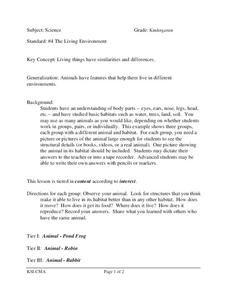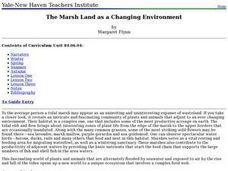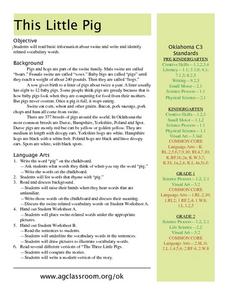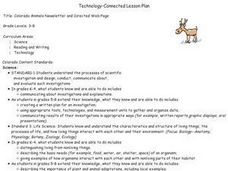Curated OER
An Orderly Wagon Train Migration
Sixth graders work in small groups to organize a wagon train for a trek westward. They determine leadership responsibilities and rules needed to make a successful trek.
Curated OER
Tornado In A Bottle
Students are able to visualize a tornado usig a simple experiment. They are divided into small groups. Students drill a 3/8 inch hole in the center of each bottle cap. Students connect the caps to the top of each other using glue. ...
Curated OER
How To Find a Site
Fourth graders identify the three basic needs of humans. They identify on a map the best places to live and make a list of items that they can find on a map - streams, river, hills, plains, forests, etc.
Curated OER
Oh Deer! and English Learner Writing Extensions
Students follow deer through Yellowstone Park and record the number of deer from year to year. In this basic needs of deer lesson, students work in small groups and chart the number of deer each year and give explanations using as...
Curated OER
The Living Environment
Students investigate animals and their environments. In this animal similarities and differences lesson, students explore animal adaptations and features and their habitats. Students get into groups to discuss the habitat and how...
Curated OER
Don’t Cry Over Spoiled Milk!
Seventh graders explore how milk spoils over time. In this biology lesson, 7th graders discover how pH changes as microorganisms enter the food and multiply. They explain the benefits of pasteurization process.
Curated OER
How to: Build a Plant Cell
Students build a 3-dimensional model of a plant cell with household objects. In this plant biology lesson, students construct replica plant cells in groups of three. After completing their projects, students share their creations with...
Curated OER
Safe Work Habits and First Aid - Level II
Identify and explain the appropriate use and care of basic kitchen equipment. Locate food preparation equipment in the laboratory Identify various types of kitchen equipment Select appropriate equipment for specific product preparation...
Curated OER
The Marsh Land as a Changing Environment
Sixth graders continue their examination of the state of Connecticut. After taking a field trip, they identify the types of birds, plants, invertebrates and vertebrates who make their home in the salt marshes. In groups, they identify...
Curated OER
What's Wild
Third graders discover the differences between wild and domestic animals. In this animal lesson, 3rd graders chart the differences in the animals and look through magazines for pictures of wild and domestic animals to glue to a poster....
Curated OER
This Little Pig
First graders study basic information about swine. They write and identify vocabulary words relating to the subject. They write a recipe for "Pigs in a Blanket," using canned crescent rolls and small sausages. They trade recipes and...
Curated OER
Animal Alphabet
Second graders identify animals with each letter of the alphabet. In groups, they create a PowerPoint presentation which shows the information they have collected about each one. Using all of this information, they create an animal...
Curated OER
The Spider Beside Her
Second graders are introduced to the characteristics of spiders. In groups, they compare and contrast spiders to different insects to discover spiders are not an insect at all. In groups, they create a model of a spider and discuss its...
Curated OER
Colorado Animals Newsletter and Directed Web Page
Students select a Colorado animal, develop a Directed Web page, and research their animal. Each member of the group combine their research and develop a Newsletter.
Curated OER
Hunger/ Nutrition
Seventh graders investigate nutrients and nutrition to determine what types of food the body needs for energy. They study each type of nutrient and why it is important to the body. They determine what a balanced diet is by completing the...
Curated OER
Renewable Energy Sources
Place learners into groups to research and present different renewable energy sources. As individuals listen to the class presentations, they take notes and then write a persuasive article defending the form of energy that they feel...
Curated OER
Starvation in the Ghettos
Learners consider the lack of nutrition experienced in Holocaust ghettos. In this Holocaust lesson, students investigate the Nazi policy of starving people out of the ghettos through their food rationing program. Learners compare Nazi...
Curated OER
Science Unit Lesson Five
Sixth graders review how and which plants operate in terrariums. In groups, they follow instructions to make their own terrarium and place different types of plants in it. To end the lesson, they review the steps in the water cycle and...
Arizona-Sonora Desert Museum
Desert People and the Saguaro
The saguaro is the focus of an examination of the importance of this stately cactus to the indigenous people in the Sonoran Desert.
Illinois Department of Natural Resources
Section One: What is Biodiversity?
Four intriguing and scientific activities invite learners to explore the natural resources of their town. The activities cover concepts such as genetic traits, organizing species in a taxonomy, the differences between different species...
Virginia Department of Education
Go with the Flow
How does nature's hierarchy relate to our local human environment? Answer this question, along with others, as the class visually depicts the natural hierarchy provided by nature. Pupils discuss each piece of the pyramid and its energy...
Virginia Department of Education
The Cycles of Nature
Encourage peer collaboration and assist with the creation of visual aids to identify carbon, water, and nitrogen cycles as your class learns more about nature. They discuss relative information, create a visual aid...
Serendip
Photosynthesis and Cellular Respiration
How does energy from the sun make plants grow? Scholars move step by step through the processes that promote plant propagation during a detailed lesson. The resource illustrates ADP production and hydrolysis, then allows learners to...
Council for Economic Education
Tax Time Scavenger Hunt
Is a 1040EZ tax form really easy? Scholars investigate the complexities of the United States taxation system with an economics instructional activity. Using a wide variety of web sources, they interpret IRS taxation rules and regulations...
Other popular searches
- Five Basic Food Groups
- Four Basic Food Groups
- 4 Basic Food Groups
- 5 Basic Food Groups
- Basic Food Groups Free
- 3 Basic Food Groups
- Basic Food Groups Worksheets























